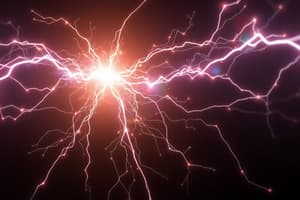Podcast
Questions and Answers
Which fundamental property of matter can be either positive or negative?
Which fundamental property of matter can be either positive or negative?
- Volume
- Electric charge (correct)
- Mass
- Density
What is the region surrounding a charged particle where other charged particles experience a force called?
What is the region surrounding a charged particle where other charged particles experience a force called?
- Electric potential
- Magnetic field
- Electric field (correct)
- Kinetic energy
What is the branch of physics that studies the interactions between electrically charged particles and the electromagnetic force?
What is the branch of physics that studies the interactions between electrically charged particles and the electromagnetic force?
- Thermodynamics
- Nuclear physics
- Electromagnetism (correct)
- Quantum mechanics
What is responsible for various phenomena, including the behavior of electric circuits, electromagnetic waves, and the interactions between magnets and moving charges?
What is responsible for various phenomena, including the behavior of electric circuits, electromagnetic waves, and the interactions between magnets and moving charges?
Which branch of physics deals with the study of matter, energy, and their interactions?
Which branch of physics deals with the study of matter, energy, and their interactions?
What carries electric charge and can accumulate on the surface of conductors and insulators?
What carries electric charge and can accumulate on the surface of conductors and insulators?
What is electric potential?
What is electric potential?
How is electric current typically measured?
How is electric current typically measured?
What are electromagnetic waves characterized by?
What are electromagnetic waves characterized by?
What role does electromagnetism play in our daily lives?
What role does electromagnetism play in our daily lives?
Why is understanding electromagnetism essential?
Why is understanding electromagnetism essential?
What does the electric potential measure?
What does the electric potential measure?
What is electric current defined as?
What is electric current defined as?
What are electromagnetic waves composed of?
What are electromagnetic waves composed of?
In which unit is electric current typically measured?
In which unit is electric current typically measured?
What does understanding electromagnetism help in predicting?
What does understanding electromagnetism help in predicting?
Flashcards are hidden until you start studying
Study Notes
Physics: The Science of the Physical World
Physics is a natural science that deals with the study of matter, energy, and their interactions. It is one of the oldest sciences and has evolved over time, incorporating various branches and subtopics. One of the most important and fundamental branches of physics is electromagnetism.
Electromagnetism: The Interplay of Electricity and Magnetism
Electromagnetism is the branch of physics that studies the interactions between electrically charged particles, such as electrons, and the electromagnetic force. This force is responsible for various phenomena, including the behavior of electric circuits, electromagnetic waves, and the interactions between magnets and moving charges.
Electric Charge
Electric charge is a fundamental property of matter that can be either positive or negative. It is carried by particles such as electrons and protons. Electric charges can accumulate on the surface of conductors and insulators, leading to the formation of electric fields. The electromagnetic force acts between charged particles, causing them to either attract or repel each other.
Electric Fields and Potential
An electric field is a region surrounding a charged particle where other charged particles experience a force. The strength of the electric field depends on the charge of the particle and the distance from it. Electric potential, denoted as V, is a scalar measure of the maximum reversible work that can be done by a unit positive test charge at any point in the field without moving the charge from its position. It is defined as the force experienced by a unit positive test charge divided by the charge itself.
Electric Current
Electric current is the flow of electric charge, usually in the form of electrons, through a conductor. It is typically measured in amperes (A) and is defined as the rate at which charge flows through a cross-sectional area of a conductor. Electric current is the result of a potential difference, or voltage, applied across the conductor.
Electromagnetic Waves
Electromagnetic waves are waves that consist of oscillating electric and magnetic fields, perpendicular to each other and to the direction of wave propagation. They can be characterized by their wavelength, frequency, and speed. The electromagnetic spectrum covers a wide range of frequencies, from radio waves with the longest wavelengths to gamma rays with the shortest.
The Importance of Electromagnetism
Electromagnetism plays a crucial role in our daily lives, from powering our electronic devices to enabling communication technologies such as radio, television, and the internet. It also has numerous applications in various industries, including medical technology, energy generation, and transportation.
Understanding electromagnetism is essential for designing and optimizing systems that involve the movement of electric charges, such as electric motors and generators, as well as for predicting the behavior of charged particles in various environments. It also helps in understanding the fundamental principles of the universe, such as the behavior of light and the properties of matter.
In conclusion, physics is a vast field that encompasses various subtopics, including electromagnetism. By studying electromagnetism, we gain a deeper understanding of the fundamental principles that govern the behavior of charged particles and the electromagnetic force. This knowledge has practical applications in various industries and enables us to harness the power of electricity and magnetism for our benefit.
Studying That Suits You
Use AI to generate personalized quizzes and flashcards to suit your learning preferences.




